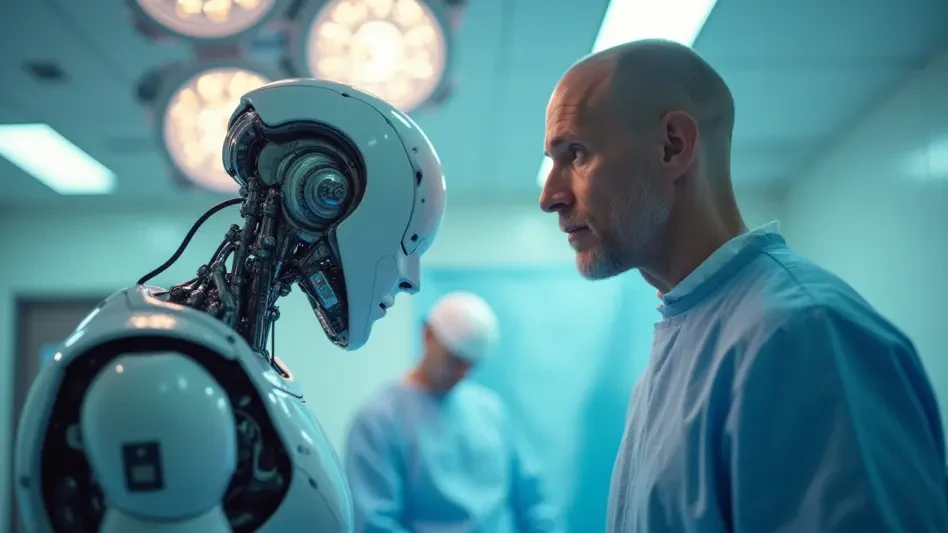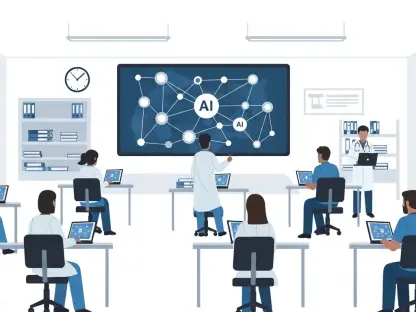The healthcare industry is at a pivotal juncture where technological advancements are increasingly being seen as potential solutions to longstanding issues, such as clinician burnout. This pervasive challenge has been a focal point of discussions within the medical community due to its implications on healthcare delivery and efficacy. A promising solution that has come to the forefront is the adoption of artificial intelligence (AI) tools. These tools have not only begun to alleviate aspects of the burdens clinicians face daily but also offer prospects for fundamentally transforming healthcare systems. The potential of AI to streamline administrative tasks and improve overall workflow efficiency presents a compelling opportunity to enhance clinician well-being and patient care quality sustainably and effectively.
Understanding Clinician Burnout
Clinician burnout has emerged as a critical problem in modern medical practice, driven by factors such as escalating administrative tasks and increasing patient load. The mental and physical strain on healthcare workers often leads to reduced job satisfaction, which can, in turn, affect patient outcomes. Traditional attempts to mitigate burnout have primarily focused on short-term solutions like wellness programs and working hour restrictions, but these have seldom addressed the underlying systemic issues. Today, the spotlight is on AI as a long-term remedy that could address the root causes of burnout by transforming how clinicians interact with technology and administrative processes.
As healthcare systems become more complex, the volume of paperwork and documentation requirements has skyrocketed, often leaving clinicians overwhelmed. By facilitating tasks like patient record-keeping and clinical note compilation, AI has the potential to significantly ease this administrative burden. The emergence of tools like AI scribes, which employ innovative ambient listening technology to draft clinical notes in real-time, provides a glimpse into how AI can reduce the administrative workload. These advancements allow clinicians to focus more on their primary role, which is patient interaction and care. Consequently, this shift is expected to foster a more patient-centric healthcare environment, where clinicians are more engaged and less encumbered by non-clinical tasks.
AI’s Role in Enhancing Healthcare Productivity
AI’s application in healthcare extends beyond alleviating burnout, with experts predicting a broader impact on productivity across the medical field. By automating routine procedures and data management tasks, AI can free healthcare practitioners to concentrate more on critical and complex clinical cases that require human intuition and expertise. However, achieving these productivity gains is contingent upon the seamless integration of AI technologies into existing healthcare infrastructures, alongside requisite policy and systemic adjustments.
The potential productivity boom in healthcare envisioned by economists could be realized through the strategic deployment of AI systems. New digital tools, powered by machine learning algorithms, are being designed to optimize patient diagnostics and treatment plans. This technological synergy could lead to faster and more accurate decision-making processes, significantly improving patient care outcomes. Moreover, AI’s predictive capabilities in analyzing large datasets can lead to early identification of health trends and outbreaks, further bolstering healthcare systems’ preparedness and responsiveness. For the full potential of these advancements to be harnessed, systemic change and stakeholder engagement at every level of the healthcare system are imperative.
Challenges and Limitations of AI Deployment
While there is palpable excitement around AI’s potential to revolutionize healthcare, it is crucial to consider the challenges and limitations that may accompany its deployment. As with any new technology, the integration of AI into day-to-day clinical practice can encounter resistance from practitioners concerned about its impact on their roles and patient interactions. A critical part of this apprehension is rooted in the fear that AI might render human judgment obsolete, or worse, create a dependency that could erode essential clinician skills over time.
Moreover, there is the question of how AI will be integrated into existing workflows without creating additional complications. A poorly implemented AI system can disrupt rather than streamline operations, exacerbating rather than alleviating the pressures of clinical practice. Furthermore, ethical considerations and the need for transparency in AI decision-making processes are paramount, given the sensitivity and complexity of healthcare decisions. Addressing these concerns requires robust training programs for healthcare professionals to ensure they fully understand and can effectively utilize AI tools within their practice.
A Strategic Approach for Successful Implementation
The successful integration of AI into healthcare systems hinges on adopting a strategic approach that encompasses technological, educational, and organizational considerations. First, comprehensive training programs must be developed to equip healthcare professionals with the necessary AI literacy, ensuring they can collaborate effectively with these technologies. Education will empower clinicians to harness AI’s capabilities to supplement and enhance patient care rather than substitute for their critical decision-making roles.
Furthermore, healthcare institutions must reevaluate their operational models to effectively integrate AI systems without disrupting existing processes. Strong collaboration between technology developers and medical stakeholders will be critical in designing AI tools that seamlessly blend into healthcare environments. Additionally, policy frameworks should be refined to ensure that AI-driven advancements are implemented ethically and equitably across different healthcare settings, focusing on improving both clinician well-being and patient outcomes.
Path Forward in AI-Driven Healthcare Transformation
Clinician burnout is a pressing issue in modern healthcare, driven by rising administrative duties and patient numbers. These burdens take a toll on healthcare workers both mentally and physically, often leading to decreased job satisfaction, which can negatively impact patient care. Historically, attempts to alleviate burnout have focused on short-term solutions like wellness initiatives and limiting work hours, often failing to solve systemic challenges. Now, there is increasing interest in AI as a sustainable solution, as it could address the root causes of burnout by reshaping clinician interactions with technology and administration.
The complexity of healthcare systems has led to a surge in paperwork and documentation, frequently overwhelming clinicians. AI has the potential to ease this burden by streamlining tasks such as patient record-keeping and clinical note-taking. Innovations like AI scribes employ ambient listening technology to draft notes in real-time, exemplifying AI’s role in reducing administrative workload. These tools free clinicians to prioritize patient care, encouraging a more patient-focused healthcare culture where the focus is on engagement and meaningful interaction.









